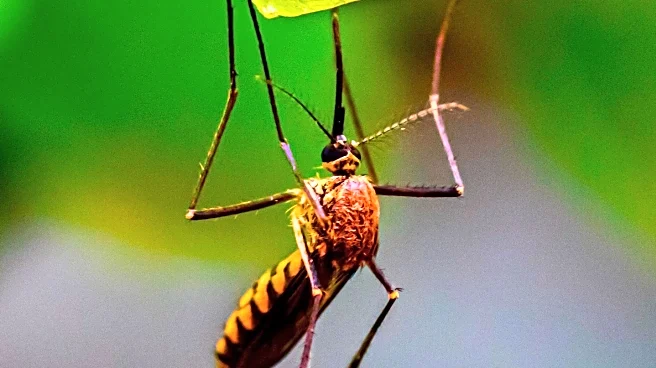What is the story about?
What's Happening?
A recent study has assessed the efficacy of 20 herbal products commonly used in Ghana for treating malaria, focusing on their potential to combat Plasmodium falciparum strains. The study identified 38 different medicinal plant products within these herbal remedies, highlighting the rich biodiversity of medicinal plants in Ghana. Among the products, MSM, formulated from Cryptolepis sanguinolenta, demonstrated potent antimalarial activity due to its indoloquinoline alkaloids. Other frequently used plants include Azadirachta indica and Alstonia boonei, known for their antimalarial properties. The study found that TTM was the most potent herbal product, followed by MSM, with significant activity against the malaria parasite. The research also explored the response of intraerythrocytic stages of P. falciparum to these herbal products, noting that MSM showed both trophozoite and schizont stage activity, potentially due to its phytochemical alkaloid groups.
Why It's Important?
The integration of herbal medicines into mainstream healthcare in Ghana represents a significant shift towards alternative treatment options. This study provides scientific backing for the efficacy of certain herbal products, which could influence public health policy and the regulation of herbal markets. The findings are crucial as they highlight the potential of these herbal remedies to contribute to the emergence of resistant malaria parasites, a concern given the structural similarities between some herbal compounds and conventional antimalarial drugs like chloroquine. The widespread use of potent herbal products like MSM could inadvertently select for resistant parasite strains, impacting malaria treatment strategies in West Africa.
What's Next?
Further assays are needed to validate the efficacy of these herbal products and their potential to induce resistance in malaria parasites. The study suggests that the pharmacokinetics of MSM and similar products should be closely monitored to prevent subtherapeutic application, which could lead to resistance. The Ghana Health Service and Ministry of Health may consider these findings in their efforts to regulate the herbal market and integrate effective herbal treatments into national healthcare protocols. Additionally, ongoing research into the phytochemical composition of these plants could lead to the development of new antimalarial drugs.
Beyond the Headlines
The study raises ethical and regulatory questions about the use of herbal medicines in unregulated markets. The potential for these products to contribute to drug resistance highlights the need for stringent quality control and scientific validation of herbal remedies. This development could also influence cultural perceptions of traditional medicine, as scientific evidence supports the efficacy of certain herbal treatments. Long-term, this could lead to increased investment in research and development of herbal medicines, fostering innovation in the pharmaceutical industry.
















